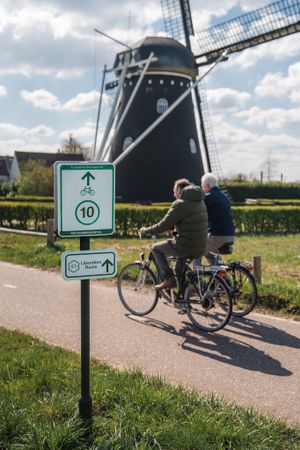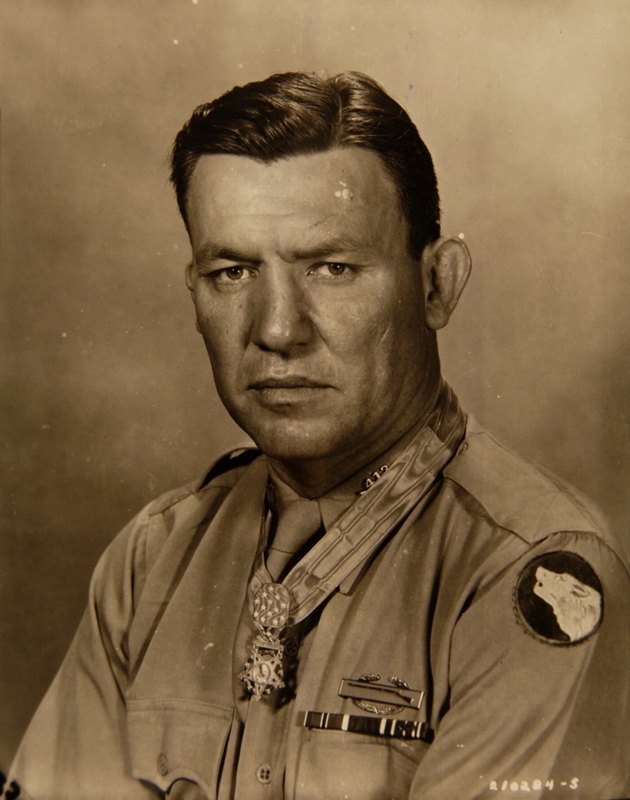The Timberwolves Cycle Route North | Liberation Route Brabant
Cycle 44 km along historic WWII sites in West Brabant and discover the story of The Timberwolves.
Starting point: from your location
Show all 4 photos
This northern cycling route of 44 km starts at the train station in Zevenbergen. Along the way, you'll pass the Mark River and the Liesbos forest. Be sure to stop for lunch in Etten-Leur and take a moment to admire the beautiful Basilica of Oudenbosch. During your ride, you'll learn more about the battles the Timberwolves fought near the Mark, where they met the Polish forces and where the remarkable story of First Lieutenant Cecil H. Bolton unfolded. (This text was translated by AI)
The Liberation Route Brabant tells the story of the liberation, but also reveals what World War II meant for ordinary people in Brabant. Eight cycling routes, spread across North Brabant, guide you along Brabant Remembers stories, audio columns from the Liberation Route Europe, monuments, and museums that together highlight the impact of the war on North Brabant. (This text was translated by AI)
Route map
You can view this r…
This northern cycling route of 44 km starts at the train station in Zevenbergen. Along the way, you'll pass the Mark River and the Liesbos forest. Be sure to stop for lunch in Etten-Leur and take a moment to admire the beautiful Basilica of Oudenbosch. During your ride, you'll learn more about the battles the Timberwolves fought near the Mark, where they met the Polish forces and where the remarkable story of First Lieutenant Cecil H. Bolton unfolded. (This text was translated by AI)
The Liberation Route Brabant tells the story of the liberation, but also reveals what World War II meant for ordinary people in Brabant. Eight cycling routes, spread across North Brabant, guide you along Brabant Remembers stories, audio columns from the Liberation Route Europe, monuments, and museums that together highlight the impact of the war on North Brabant. (This text was translated by AI)
Route map
You can view this route page on your telephone or download the GPX file. If you prefer to go on the walk using a paper map, you can order one in our webshop.
Brabant Remembers
During the Second World War, lives were profoundly changed forever. Brabant Remembers relates personal stories about the Second World War, major or minor: about mobilisation, resistance, collaboration or liberation – stories about events that centre around a life-changing moment.On the Liberation Route Brabant you pass places where these stories have taken place. Brabant Remembers wants to preserve the stories and experiences of those who went through the war and pass them on to future generations.Would you like to know more about Brabant Remembers, stories and explore similar routes? Check out brabantherinnert.nl.
Liberation Route Europe
This walking tour through North Brabant is part of the Liberation Route Europe, a network of 10,000 kilometres of walking tours throughout all of Europe. The walking tours go past museums, monuments, cemeteries and historic locations that remind us of the final phase of the Second World War. With hundreds of places and stories distributed over twelve European countries, the Liberation Route Europe connects the regions through which the Allies progressed in 1943-1945. Visit liberationroute.com for more information.
About this route
The route is marked out using the Brabant numbered junction system. Simply follow the Liberation Route Europe marks with the maple leaf. The route between the junctions is marked by arrows. If there is anything wrong with the signposting along this route, please report this on visitbrabant.com/meldpunt You can also call us on +31(0)800 4050050.
-
Liberation Route Brabant direction signs
Follow the 'Liberation Route' signs. These are hanging under the regular junction signs.

Liberation Route Brabant direction signs
Follow the 'Liberation Route' signs. These are hanging under the regular junction signs.

-
Hotline routes
Hotline routesIf there is something wrong on the route, report it here.
Sights on this route
Starting point
Stationslaan 1
4761 BG Zevenbergen
Navigate to starting point
Vector: Church brings salvation
The city of Zevenbergen was bombed twice during World War II, killing a total of 125 civilians. However this number would have been much higher had about 2,500 civilians not managed to find the shelter under the Bartholomeus (St Bartholomew's) Church in time.
Starting point:
Markt 44761 CD Zevenbergen

Vector: Battle of the Dykes
On Monday 30 October 1944, the village of Leur was liberated without any significant resistance. The US 414th Infantry Regiment, part of the 104th Infantry Division known as the Timberwolves, was then ordered to advance north and form a bridgehead over the Mark River.
Starting point:
LangewegEtten-Leur

Vector: The Timberwolves meet a Polish Division
One such meeting of “friends” took place on a cold Monday on 30 October 1944.
Starting point:
Moerdijkse PostbaanBreda

Vector: The Timberwolves meet a Polish Division
Vector: The Timberwolves meet a Polish Division
Moerdijkse Postbaan
Breda
Vector: No Timberwolves in Breda!
When speaking about the liberation of the Dutch city of Breda, the role of the Polish forces is what first comes to mind. After all, it was the 1st Polish Armored Division that liberated this old Brabant city on 29 October 1944.
Starting point:
Bisschopsmolenstraat 1694879 AL Etten-Leur

Vector: No Timberwolves in Breda!
Vector: No Timberwolves in Breda!
Bisschopsmolenstraat 169
4879 AL Etten-Leur
Hotel Restaurant ‘t Witte Paard

With the intimate hospitality of a family hotel, the Herberg & Wijnwinkel ’t Witte Paard (White Horse Inn & Wine Shop) in Etten-Leur offers everything that lovers of the good things in life will appreciate.
Starting point:
Oude Bredaseweg 154872 AB Etten-Leur

Hotel Restaurant ‘t Witte Paard
Hotel Restaurant ‘t Witte Paard
Oude Bredaseweg 15
4872 AB Etten-Leur
Vector: Liberation battle in Hoeven
During the liberation of the village of Hoeven there was heavy fighting and resistance resulting in civilian casualties.
Starting point:
De Heul 354741 TS Hoeven

Vector: Two monasteries are liberated
Before moving on to the village of Standdaarbuiten, the American Timberwolves liberated the town of Oudenbosch without much resistance. The Sisters of the Saint Anna Convent and the Monks of the Saint Louis Monastery, along with the rest of the town, were overjoyed.
Starting point:
50 Saint Louisplein4731 PK Oudenbosch

Vector: Two monasteries are liberated
Vector: Two monasteries are liberated
50 Saint Louisplein
4731 PK Oudenbosch
Vector: Saving the Basilica
At the end of the war, German troops on the retreat were ordered to preemptively blow up all church towers.. However, when it became necessary to destroy the Basilica of Oudenbosch town in the Netherlands, German Generalleutnant Walter Stein decided not to do so.
Starting point:
Basiliek OudenboschMarkt 57
4731 HN Oudenbosch

Vector: Saving the Basilica
Vector: Saving the Basilica
Basiliek Oudenbosch
Markt 57
4731 HN Oudenbosch
Vector: Allen Bridge: British troops build bridges for Timberwolves
The most important operation for the Timberwolves Division in West Brabant was the formation of a bridgehead across the Mark River at Standdaarbuiten village.
Starting point:
Sint Antoinedijk 344751 SE Oud Gastel

Vector: Allen Bridge: British troops build bridges for Timberwolves
Vector: Allen Bridge: British troops build bridges for Timberwolves
Sint Antoinedijk 34
4751 SE Oud Gastel
US Division under Canadian command!
Before this, never in military history had a US Division operated under the command of a Canadian general. This rather unusual honour occurred for the US 104th Infantry Division, better known as the Timberwolf Division, in West Brabant.
Starting point:
Havenstraat 14758 BP Standdaarbuiten

US Division under Canadian command!
US Division under Canadian command!
Havenstraat 1
4758 BP Standdaarbuiten
Vector: First Lieutenant Cecil H. Bolton receives a Medal of Honor
On the night of 2 November 1944, First Lieutenant Cecil H. Bolton played a pivotal role in the fighting for the village of Standdaarbuiten.
Starting point:
Havenstraat 234758 BP Standdaarbuiten

Vector: First Lieutenant Cecil H. Bolton receives a Medal of Honor
Vector: First Lieutenant Cecil H. Bolton receives a Medal of Honor
Havenstraat 23
4758 BP Standdaarbuiten
Vector: A Norwegian Spitfire crashes near Standdaarbuiten
In late October 1944, Allied ground troops were more or less stuck near the Mark/Dintel River in northwestern Brabant.
Starting point:
Molendijk 254758 SE Standdaarbuiten

Vector: A Norwegian Spitfire crashes near Standdaarbuiten
Vector: A Norwegian Spitfire crashes near Standdaarbuiten
Molendijk 25
4758 SE Standdaarbuiten
Vector: The first American attempt to cross the River Mark
In the early morning of 31 October 1944, a group of American troops rowed across the River Mark. Their aim was to surprise the German defenders and form a bridgehead on the north side of the river.
Starting point:
Molendijk 274758 SE Standdaarbuiten

Vector: The first American attempt to cross the River Mark
Vector: The first American attempt to cross the River Mark
Molendijk 27
4758 SE Standdaarbuiten
Story of the route
Never before in military history had an American division operated under Canadian command. This rather remarkable honor fell to the 104th US Infantry Division in West Brabant. The infantry division is much better known as the Timberwolf Division.
West Brabant was liberated in the autumn of 1944 by a truly international force. General Crerar’s First Canadian Army included not only Canadian divisions, but also a British, a Polish, and an American division under its command. The division was unique in several ways, as it was the first unit to disembark directly from America onto French soil at Cherbourg (Normandy), on September 7, 1944.
After weeks of waiting, the Americans — about 18,000 in total — arrived at the Dutch-Belgian border, south of Zundert. Apart from their general, Terry Allen, the entire division was largely inexperienced. Their first contact with the enemy took place on October 25 near the customs office on the road from Zundert to Wuustwezel. They encountered fierce German resistance in several locations, including Wernhout and Achtmaal. Afterward, the American advance proceeded much more smoothly, and in the final days of October they liberated many towns in West Brabant.
In the following days, the advance slowed down considerably. Their most difficult operation was crossing the Mark River near Standdaarbuiten and establishing a bridgehead on the opposite bank. After heavy fighting and severe losses, Standdaarbuiten was firmly secured by American forces. On November 5, they reached the Hollands Diep — the main objective of the operation. That same day, General Allen received word that he was to quickly break off combat operations in the Netherlands and proceed to Aachen.
The 104th Timberwolf Division suffered approximately 170 casualties and many more wounded in their fight to liberate West Brabant.
“Nothing in hell can stop the Timberwolves”
— General Terry Allen
(This text was translated by AI)
- 37
- 41
- 01
- 10
- 44
- 07
- 08
- 45
- 24
- 23
- 21
- 62
- 50
- 61
- 04
- 78
- 78
- 83
- 80
- 81
- 31
- 33
- 13
- 14
- 37






